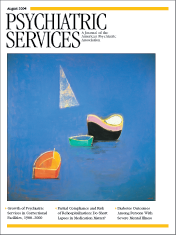Little has been written about the use of clinical street outreach to homeless persons as a training opportunity for medical students and resident physicians. At the University of Florida, under the auspices of the community psychiatry program, medical students and family practice residents have an opportunity to learn the principles of community psychiatry through involvement in an outreach program for homeless persons.
Homeless Outreach to Promote Empowerment (HOPE) is a city-funded mobile outreach initiative at the I. M. Sulzbacher Center, a large facility for homeless people located in urban Jacksonville, Florida. The multidisciplinary team comprises a social worker, a nurse, and an attending psychiatrist affiliated with the University of Florida's Community Psychiatry Program. It is an assertive outreach program that seeks to engage homeless persons who have mental illness or addictions, or both, in treatment and case management. Medical students and family medicine residents are given the opportunity to spend one day a week during their month-long rotations participating as members of the outreach team under the supervision of the attending psychiatrist. More than 1,200 homeless persons are served through this initiative each year. Approximately 35 medical students and ten residents participate on a rotating basis.
Before they participate in this clinical initiative, students and residents are given a presentation on the causes and consequences of homelessness at both the national and local levels. We emphasize the contribution of mental illness and addiction in a person's journey to the streets. Moreover, we highlight the unique role that community psychiatry can play in addressing the needs of this underserved population through clinical, administrative, advocacy, and policy-making efforts. We provide an overview of the theory and practice of assertive psychiatric outreach as well as the specific details of the HOPE team's activities. The educational goals are to expand trainees' knowledge and to underscore community psychiatry's special contribution in serving a population that is outside the formal web of mental health services.
Initial contact with persons who are living on the streets and attempts at engagement are frequently challenging for the trainees, given the nontraditional and unconventional settings in which these encounters occur. Trainees learn that engagement usually involves a combination of providing food and clothing with offers of help in negotiating the mental health and addiction systems of care. Trainees discover that this process is frequently protracted and arduous. They also learn techniques for identifying opportunities to motivate and persuade homeless people to accept treatment, housing, and case management services.
Trainees discover that services that are "accessible," or available, to marginalized populations may not always be "acceptable"—for example, medications or substance abuse treatment. The educational goals are focused less on skill acquisition and more on expanding knowledge and influencing attitudes. Trainees have the opportunity to draw on the rich experience of team members who have long-term relationships with the homeless persons being served, including knowledge of their longitudinal clinical course and of the social, mental health, and addiction services available to them in the community. This knowledge is critical for physicians practicing in underserved communities. Trainees also learn to reflect critically on the forces that contribute to homelessness, including personal factors such as substance abuse and chronic mental illness as well as systemic problems such as lack of low-income housing and lack of access to timely health care.
Although a majority of our trainees will not be entering psychiatry as a profession, the lessons learned have the unique potential to affect their future involvement with poor and medically underserved populations as well as to broaden their exposure to community psychiatry.

